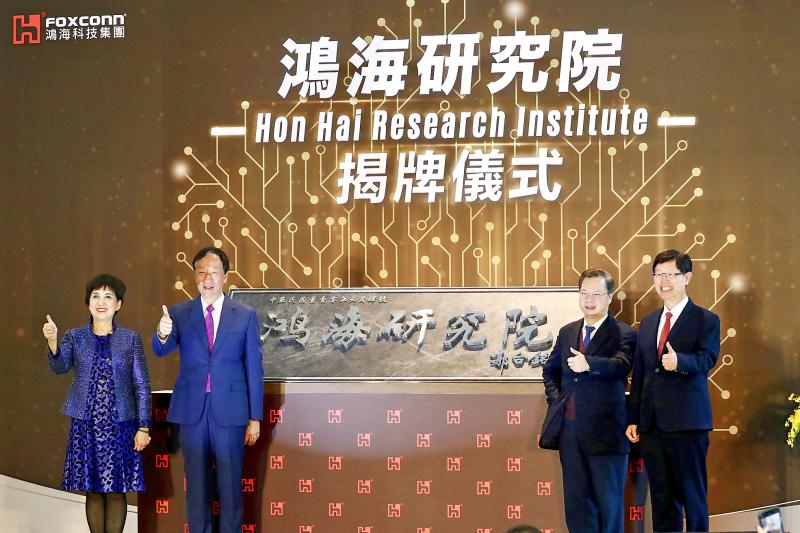Taiwan needs more high-end companies than just Taiwan Semiconductor Manufacturing Co (TSMC, 台積電) to remain competitive, but it must also tackle its low birthrate, Terry Gou (郭台銘), founder of Apple Inc supplier Hon Hai Precision Industry Co (鴻海精密), said yesterday.
Speaking at a ceremony to mark the founding of the Hon Hai Research Institute, Gou said he hoped that his company, also known as Foxconn Technology Group (富士康科技集團), would one day be on par with the TSMC, the world’s largest contract chipmaker.
As a critical link in the global semiconductor supply chain and a major supplier for US tech companies, TSMC has been dubbed by foreign experts as Taiwan’s “silicon shield” and one of the reasons why the West needs to help defend the country in the event of a conflict with China.

Photo: Ritchie B. Tongo, EPA-EFE
However, Gou said that a “silicon shield” is not enough and he expressed concern over Taiwan’s shrinking birthrate.
The dwindling birthrate appears to be an unstoppable trend that would lead to an aging population, which in turn might affect the future of Taiwan’s industry, he said.
Taiwan needs to boost its low birthrate, and it also needs more private-sector spending on research and development to transform and upgrade its industry, Gou said.
More companies should join TSMC to reinforce the “silicon shield,” he added.
Also speaking at the ceremony, National Development Council Minister Kung Ming-hsin (龔明鑫) expressed similar views about the need to strengthen the “shield.”
Kung said he hoped that Hon Hai, the world’s largest contract manufacturer, will expand its business model beyond hardware manufacturing.
Citing Hon Hai chairman Young Liu’s (劉揚偉) launch of a platform to develop electric vehicle (EV) hardware and software, Kung said he hoped other companies will join the effort.
Hon Hai is seeking to diversify a business that depends on Apple for half of its revenue.
Early last year, the company announced a plan to form a joint venture with Fiat Chrysler Automobiles NV to develop and make EVs in China, although it would not be involved in any assembly itself.
In October, the company unveiled its first EV chassis as well as an open software platform that is aimed at helping EV makers deliver models to the market faster.
It is to start shipping its first developer kit in April.
The company has been supplying parts to other major automakers including Tesla Inc.
“The electric vehicle-related business will be very good in the first half of 2021,” Liu said at a company event last month.
Hon Hai shares extended gains yesterday after analysts at JPMorgan Chase & Co and Wedbush Securities Inc forecast robust iPhone sales, closing up 8.59 percent at NT$99.9 in Taipei trading, outperforming the broader market’s 1.15 percent rise.
Separately yesterday, Hon Hai did not respond to a Bloomberg News report that the company is in talks to invest in embattled Chinese electric-vehicle start-up Byton Ltd (拜騰).
The report said Hon Hai plans to invest about US$200 million and the companies aim to start mass production of the Byton M-Byte by the first quarter of next year, citing people familiar with the matter.
Such a deal would be a lifeline for Byton, which is struggling to produce its first vehicle after unveiling its M-Byte concept car several years ago.
Hon Hai is also talking to other Chinese EV makers on potential collaborations, another person said.

South Korea’s equity benchmark yesterday crossed a new milestone just a month after surpassing the once-unthinkable 5,000 mark as surging global memory demand powers the country’s biggest chipmakers. The KOSPI advanced as much as 2.6 percent to a record 6,123, with Samsung Electronics Co and SK Hynix Inc each gaining more than 2 percent. With the benchmark now up 45 percent this year, South Korea’s stock market capitalization has also moved past France’s, following last month’s overtaking of Germany’s. Long overlooked by foreign funds, despite being undervalued, South Korean stocks have now emerged as clear winners in the global market. The so-called “artificial intelligence

NEW IDENTITY: Known for its software, India has expanded into hardware, with its semiconductor industry growing from US$38bn in 2023 to US$45bn to US$50bn India on Saturday inaugurated its first semiconductor assembly and test facility, a milestone in the government’s push to reduce dependence on foreign chipmakers and stake a claim in a sector dominated by China. Indian Prime Minister Narendra Modi opened US firm Micron Technology Inc’s semiconductor assembly, test and packaging unit in his home state of Gujarat, hailing the “dawn of a new era” for India’s technology ambitions. “When young Indians look back in the future, they will see this decade as the turning point in our tech future,” Modi told the event, which was broadcast on his YouTube channel. The plant would convert

‘SEISMIC SHIFT’: The researcher forecast there would be about 1.1 billion mobile shipments this year, down from 1.26 billion the prior year and erasing years of gains The global smartphone market is expected to contract 12.9 percent this year due to the unprecedented memorychip shortage, marking “a crisis like no other,” researcher International Data Corp (IDC) said. The new forecast, a dramatic revision down from earlier estimates, gives the latest accounting of the ongoing memory crunch that is affecting every corner of the electronics industry. The demand for advanced memory to power artificial intelligence (AI) tasks has drained global supply until well into next year and jeopardizes the business model of many smartphone makers. IDC forecast about 1.1 billion mobile shipments this year, down from 1.26 billion the prior

People stand in a Pokemon store in Tokyo on Thursday. One of the world highest-grossing franchises is celebrated its 30th anniversary yesterday.